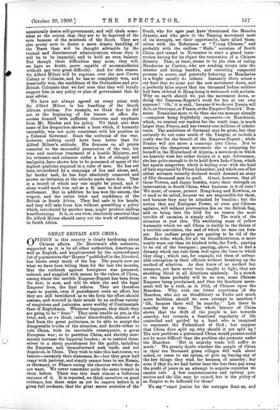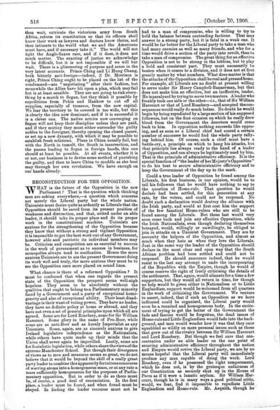GREAT BRITAIN AND CHINA.
OPINION in this country is clearly hardening about Chinese affairs. Dr. Morrison's able narrative, supported as it is by all other authorities, American as well as English, and supplemented by the extraordinary list of payments to the"Boxers "published in the Standard, has blown away much of the fog. The people now see what we have been telling them for the last two months, that the outbreak against foreigners was prepared, ordered, and supplied with means by the rulers of China, among whom the terrible Empress-Regent has been from the first, is now, and will be while she and the legal Emperor lives, the final referee. They are therefore eager to punish, even if punishment costs an effort, but they are still bewildered as to the form the effort should assume, and worried in their minds by an endless variety of suspicions and jealousies more worthy of Continentals than of Englishmen. Whatever happens, they think they are going to be "done." They seem unable as yet, in the total, and, as we think, rather discreditable, absence of a lead from the great politicians, to be able to accept the disagreeable truths of the situation, and decide either to rule China, with its inevitable consequence, a great European war ; or to partition China, and thereby enor- mously increase the Imperial burden; or to restrict them- selves to a sharp punishment for the guilty, including the Empress, and thenceforward seek trade, and not dominion, in China. They wish to take this last course, we believe—certainly their statesmen do—but they grow half crazy- with jealousy, and simply cannot bear to see Russia, or Germany, or France eating the cherries which they do not want. We never remember quite the same temper in them before. There was this week almost a ludicrous instance of it. It is reported, we think ourselves on good evidence but there must as yet be reserve before it is given full credence, that the great secret societies of the South, who for ages past have -threatened the Manchu dynasty, and who gave to the Taeping movement most of its strength, see their Opportunity, have allied them- selves with the Reformers or "Young Chinese," and probably with the endless " Mafia " societies of South China, and intend in November to start a grand insur- rection having for its object the restoration of a Chinese dynasty. That, at least, seems to be he idea of ruling Mandarins at Canton, who are sending troops into the interior and hiring bandits, and executing suspected persons in scores, and generally behaving as Mandarins in a fright usually do behave. Instantly there arises a cry here that we must put the new movement down, and a perfectly false report that ten thousand Indian soldiers had been ordered to Hong-kong is welcomed with acclaim. Why on earth should we put the movement down, so doing the Empress-Regent's work for her at our own expense ? it is said, because if we do not Russia will do it, or Germany, or France, or the EmperorMenelek.' Non- sense. Russia has more to do than she can manage already —conquest being frightfully expensive—in Manchuria, which, we remind our readers for the tenth time, is much larger than France, and has twenty-one millions of inhabi- tants. The ambitions of Germany may be great, but they certainly do not come south of the Yangtse, or include .a costly war for the benefit of- the Empress-Regent ; while France will not move a conscript into China. Not to mention the dangerous movement she is preparing for herself in the Hinterland of Algeria, a movement in which we heartily wish her either victory or a safe deliverance, she has quite enough to do to hold down Indo-China, which her agents misgovern, which is boiling over with the kind of hate expressed by Prince Inkanthor, and which one of her ablest servants recently declared would demand an army of fifty thousand men to quell. Grant., however, that all these Powers, and Japan besides, waste their strength on intervention in South China, what business is it of ours? We must, of course, protect Hong-kong and Kowloon, as it used to be called, because we are responsible for them, and because they may be attacked by bandits ; but the notion that any European Power, or even any Chinese agitator, will without provocation fire on the British flag, and so bring into the field for no reason the most terrible of enemies, is simply silly. The truth of the situation is just this. The sweltering mass of yellow humanity which we call China is visibly in the throes of a terrible convulsion, the end of which no man can fore- see. Her endless peoples are panting to be rid of the Manchu tribe, which, for all its bloodthirstiness, is more nearly worn out than its kindred tribe, the Turk ; panting to be rid of the foreigner ; panting, above all, to find a dynasty which can rule them well upon the lines to which they cling ; which can, for example, rid them of unbear- able corruption in their officials without breaking up the method of selection. As they know of no method but massacre, yet have never been taught to fight, they are shedding blood in all directions aimlessly. In a month or two there probably will be an aim, some Chinese Emperor being proclaimed, and then the Southern move- ment will be a rush, as in 1863, of Chinese upon the Manchus. Why, with our bitter experience of the Manchus, who are as bloodthirsty as Turks and much more faithless, should we even attempt to interfere ?
Oh, because there will be anarchy.' Let there be anarchy for a time. The whole history of China shows that the drift of the people is not towards anarchy, but towards a fossilised regularity of life controlled and guided by a head who is imagined to represent the Fatherhood of God ; but suppose that China does split up, why should it not split up ? The new problems a pulverised China would present could not be more difficult than the problem she presents under the Manchus. 'But in anarchy trade will suffer so much.' We greatly doubt whether the people of China in their ten thousand green -villages will walk about naked, or cease to eat opium, or give up buying-any of the few things they wish for because of anarchy; but even if they do, we had better bear the loss than pay away the profit of years in an attempt to acquire countries we cannot rule. A few concessionaires and railway pro- moters and the like may be ruined, but is the policy of an Empire to be deflected for them?
We say 'exact justice for the outrages done us, and then wait, extricate the victorious army from South Africa, reform its constitution so that its officers shall know their work as lawyers and doctors know theirs, and then intimate to the world what we and the Americans must have, and if necessary take it." The world will not fight the Anglo-Saxon race, and if it does, it does not much matter. The exacting of justice we acknowledge to be difficult, but it is not impossible if we will but wait. There is a glimmering of purpose and sense in the very latest accounts. Prince Ching and Li Hung Chang, both bitterly anti-foreign----indeed, if Dr. Morrison is right, Prince Ching ought to be placed on the list of the condemned—are " negotiating " after their fashion, but meanwhile the Allies have hit upon a plan, which may fail but is at least sensible. They are not going to risk every- thing by a march to Segan, but they think it possible by expeditions from Pekin and Hankow to cut off all supplies, especially of treasure, from the new capital. We fear the territory to be covered is too wide, but this is clearly the idea now dominant, and if it is successful it is a clever one. The native armies now converging on Segan will not keep their discipline unless they are paid, and if they mutiny they must either surrender the guilty nobles to the foreigner, thereby opening the closed passes, or set up a new dynasty, with which it may be possible to establish fresh relations. Plans in China usually fail, but with the North in tumult, the South in insurrection, and the passes leading to Segan in foreign hands, this one should at least be possible. At all events, whether it is or not, our business is to devise some method of punishing the guilty, and then to leave China to muddle as she best may through her own revolution. We have enough on our hands already.







































 Previous page
Previous page